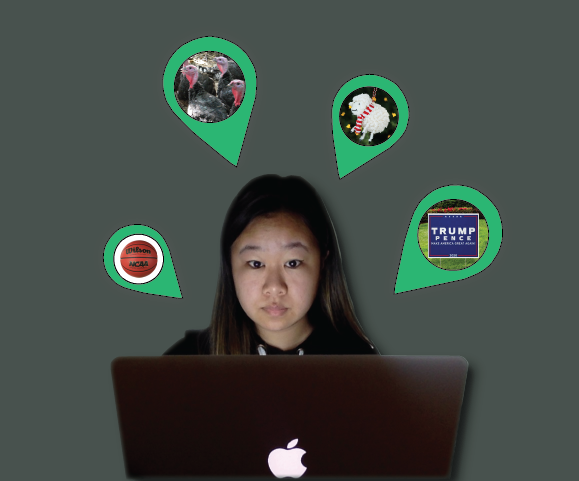In 2019, The New York Times released a story that followed millennial and baby boomer journalists as they explored the then new and sensational Gen Z social media platform, TikTok.
Due to the story’s success, I thought it’d be exciting to repeat it and, on behalf of Gen Z, forge into unknown boomer social media territory. After rejecting Facebook as an idea, I settled on every mom’s favorite app, Nextdoor.
Although its cheerful green and white branding markets the app as the opposite of exciting, 48 hours on the app proved that it would be just as strange and entertaining as a Gen Z app.
Boasting over 27 million active users and 236,000 defined neighborhoods, Nextdoor is a neighborhood networking platform created for “trusted connections and the exchange of helpful information.”
With an audience of mainly middle-aged adults and senior citizens, its platform works like a simplified Reddit, allowing audience members to make discussion posts in select neighborhoods or specific topic sections. Although users can’t “follow” each other, they’re able to send direct messages.
Although I had created an account a year ago (also for a newspaper endeavor), I didn’t check the app regularly; however, as soon as I logged in, my account’s notification bell was immediately flooded with alerts. In the spirit of creating community, the app is designed to notify you with a weekly briefing of all the top posts made in your neighborhood.
Clicking onto this week’s briefing, I found the top post of the week, containing over 400 smiley and heart reactions. The post was a heartfelt, open thank-you letter that a user wrote to the anonymous stranger who had returned her dropped sheep ornament on the side of this road.
My exploration was off to a wholesome start.
I continued scrolling down my briefs to find a picture of a large bird crossing the street. The caption above the picture read, “What are these? Please identify.”
The answers did not disappoint. While some commenters suggested that the birds could be turkey fowls, others were quick to debunk the suggestion, knowledgeably citing annual Bay Area turkey migration patterns and turkey altitudinal preferences as evidence.
Other commenters took the liberty of responding in dad joke fashion (unsurprising as the majority of user demographics are parents), commenting “an Italian dinner” or “Just look at the eyes. Definitely lemurs.”
After reading through the comments and chuckling at the occasional joke, I clicked out of the post feeling more confident than ever about my knowledge on the turkeys, or Meleagris gallopavo (their scientific name, as I had learned from the comments).
All the posts I saw initially were well intentioned and friendly. Since angry disagreements and vicious comments are, unfortunately, a staple of Gen Z social media culture, I was curious to see if arguments ever mar lored the perpetually optimistic boomer bubble of Nextdoor.
Coming from a place of strong generational nationalism, I decided that it couldn't be that Gen Z was just more prone to virtual arguments and polarization, so I decided to do some digging on posts that were most likely to be discourse-charged — political posts.
I scrolled down to my late October briefs, when talk about the election was in full swing. Sure enough, the top post of that week was semi-political. A neighbor alleged that their Trump 2020 yard sign had been stolen in the middle of the night by a group of perceived teenage girls.
The comment section under this post was a divided one.
While some neighbors condemned the teens’ alleged actions, other neighbors defended the stealing of the yard sign, stating that the teens were simply “taking out the trash.” Others quickly shot back, suggesting the author of the post to place rat traps on his signs to either hurt or catch the “thieves” who tried to take the signs again.
After spending 30 minutes wading through all the comments, it became clear that despite its peaceful, sleepy front, NextDoor, too, was not safe from the malicious clutches of political polarization and inflamed keyboard courage.
Following that revelation, I let myself indulge in the spicy comment sections of a few more controversial posts before closing out my exploration session for the night.
As I was about to leave Nextdoor, a final post caught my eye. The post was only a few words and read “Found basketball … Wilson. NCAA Performance 27.5. Please call and identify.” Below the post, another user helped clarify that the basketball was (like all other basketballs?) probably reddish brown.
Although it might have been that the post simply flew over my un-athletically-inclined head, I was thoroughly confused — and impressed — by the community’s ability to analyze the four word description enough to find the basketball’s owner.
Similar to how the TikTok Gen Z created a semi-coded language through emojis and internet slang, it seemed that the boomer Nextdoor community also created a mode of communication, undecipherable to outsiders, out of concise one-liners.
Ultimately, Nextdoor is a satisfying combination of the wholesome, the educational, the political and the plain absurd — all directly sourced from your neighbors.
Having said that, I will not be logging off anytime soon.
























